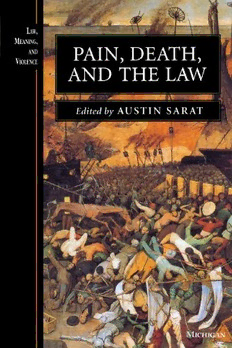
Pain, Death, and the Law PDF
Preview Pain, Death, and the Law
Pain, Death, and the Law Law, Meaning, and Violence ThescopeofLaw,Meaning,andViolenceisdefinedbythewide-rangingscholarly debatessignaledbyeachofthewordsinthetitle.Thosedebateshavetakenplace amongandbetweenlawyers,anthropologists,politicaltheorists,sociologists,and historians,aswellasliteraryandculturalcritics.Thisseriesisintendedtorecognize theimportanceofsuchongoingconversationsaboutlaw,meaning,andviolenceas wellastoencourageand furtherthem. SeriesEditors: MarthaMinow,HarvardLawSchool ElaineScarry,HarvardUniversity AustinSarat,AmherstCollege Narrative, Violence,andtheLaw:The EssaysofRobertCover, editedbyMarthaMinow,MichaelRyan,andAustinSarat Narrative,Authority,andLaw,byRobinWest ThePossibilityofPopularJustice:ACaseStudyofConl111unityMediation in the United States,editedbySallyEngleMerryandNealMilner LegalModernism,byDavidLuban Surveillance, Privacy,andtheLaw: EmployeeDrugTestingandthePoliticsofSocialControl, byJohnGilliom LivesofLawyers:Journeys in theOrganizationsofPractice,byMichaelJ.Kelly UnleashingRights:Law,Meaning, andtheAnil11a1RightsMovement,byHelenaSilverstein LawStories,editedbyGaryBellowandMarthaMinow ThePowersThat Punish:PrisonandPoliticsin theEraofthe"BigHouse," 1920-1955, byCharlesBright LawandthePostnlOdernMind: EssaysonPsychoanalysisandJurisprudence, editedbyPeterGoodrichandDavidGrayCarlson Russia'sLegalFictions,byHarrietMurav StrangerstotheLaw:GayPeopleonTrial,byLisaKeenandSuzanneB.Goldberg Butterfly,theBride:Essayson Law,Narrative,andtheFamily,byCarolWeisbrod ThePoliticsofComnlunityPolicing:RearrangingthePowertoPunish,byWilliamLyons LawsofthePostcolonial,editedbyEveDarian-SmithandPeterFitzpatrick WhisperedConsolations: LawandNarrativeinAfricanAmericanLife, byJon-ChristianSuggs BadBoys:PublicSchoolsin theMakingofBlackMasculinity,byAnnArnettFerguson Pain,Death,andtheLaw,editedbyAustinSarat Pain, Death, and the Law Edited by Austin Sarat AnnArbor THE UNIVERSITY OF MICHIGAN PREss Copyright©bytheUniversityofMichigan2001 Allrightsreserved PublishedintheUnitedStatesofAmericaby TheUniversityofMichiganPress ManufacturedintheUnitedStatesofAmerica @Printedonacid-freepaper 2004 2003 2002 2001 432 1 Nopartofthispublicationmaybereproduced,storedinaretrievalsystem, ortransmittedinanyformorbyanymeans,electronic,mechanical,or otherwise,withoutthewrittenpermissionofthepublisher. A elPcatalogrecordfor thisbookisavailablefrom theBritishLibrary. LibraryofCongressCataloging-in-PublicationData Pain,death,andthelaw / editedbyAustinSarat. p. cm.- (Law,meaning,andviolence) ISBN0-472-09767-9(cloth:acid-freepaper)- ISBN0-472-06767-2 (paper:acid-freepaper) 1.Capitalpunishment-UnitedStates. 2.Body,Human-Lawand legislation-UnitedStates. 3.Pain-Socialaspects. I.Sarat, Austin. II.Series. KF9227·C2P35 2001 345·73'0773-dc21 00-012320 Contents Introduction: OnPainand DeathasFactsof LegalLife 1 Austin Sarat TheProblemofPaininPunishment: HistoricalPerspectives Karl Shoemaker KillingMeSoftly: CapitalPunishmentand the TechnologiesforTakingLife 43 AustinSarat WhattheLawMustNotHear: OnCapital Punishmentand theVoice ofPain Timothy V. Kaufman-Osborn TheSacredNameofPain: TheRoleofVictim ImpactEvidenceinDeathPenalty SentencingDecisions 103 Jennifer L. Culbert TheProblemofPainandtheRightto Die 137 ShaiJ. Lavi Contributors Index Introduction: On Pain and Death as Facts of Legal Life Austin Sarat [T]helawrevealsitselfforwhatitis:lessthecommandthathas deathasitssanction,thandeathitselfwearingtheface oflaw.... Thelawkills. Deathisalwaysthehorizonofthelaw:ifyoudothis, youwilldie. -MauriceBlanchot(The StepNot Beyond,24-25) "Legalinterpretationplaysona field ofpainand death." Theseare the wordswithwhichRobertCoverbegan"ViolenceandtheWord."lThat essaywas designed to reorient legal theory, or at least to remind legal scholarseagerlypursuingtheinterpretiveturnortheparallelsbetween law and literature ofthebase materiality ofthe legal enterprise. While Cover's work is now regarded as something of a classic in contempo rarylegalthought,2surprisinglyfew scholarshave takenuphis invita tion to explore the intimate connections among pain, death, and the law) The scholarship collected here is intended to serve as something ofa correctivetothatfact. Itputspainand deathatthecenterofthink- 1.RobertCover,"ViolenceandtheWord,"YaleLawJournal95(1986):1601. 2. AsJonathanSimonputs it, "Cover's 'Violence and the Word' stillhaunts us a decadelaterinpartbecauseitsoundedsuchadissonantnoteintheintellectualtrendsof itstime....Thegreatvalueof'ViolenceandtheWord'ispreciselyinitsalarminginsis tencethatlaw'sviolencebeacknowledged,notjustattheextremitiesofthelegalorder, butatthecenteroftheprocessinjudicialinterpretation."See"TheVicissitudesofLaw's Violence,"typescript,1998,10. ).ForexceptionsseeAustinSaratandThomasR.Kearns,"AJourneythroughFor getting: Toward aJurisprudence ofViolence," in The Fate ofLaw, ed. AustinSaratand ThomasR.Kearns(AnnArbor:UniversityofMichiganPress,1991);andDesmondMan derson,ed.CourtingDeath:TheLawofMortality(London:PlutoPress,1999). 2 PAIN, DEATH, AND THE LAW ing about law, highlighting the way law imagines the body in pain as wellasthewaypainand deathbecomejurisprudentialfacts. AsCovercorrectlyobserved,despitetheirundeniablesignificance, painanddeathhaveplayedlittlerole,andoccupiedlittlespace,inlegal theoryandjurisprudence.4Or,whentheyarepresent,awarenessofthe painordeathdone,orauthorized,byofficialsaredivorcedfromactsof interpretation, as if the act of speaking or writing the words of law couldbeseparatedfrom theinscriptionofthosewordsonthebodiesof citizens.5By failing to confrontlaw's lethal character and the masking of its interpretive violence, legal theory tacitly encourages officials to ignorethebloodyconsequencesoftheirauthoritativeactsandthepain thoseactsproduce. Moreover,byequatingtheconditionsoflegallegit imacy with that masking, much of legal theory promotes righteous indifferenceandallowspainanddeathtoproceedunabated. Law,sur rounded by so much pain and death, is, nonetheless, able to maintain itscalm,bureaucraticfacade. Neither traditional nor critical jurisprudence have truly come to terms with the fact that the business of law, when everything else is saidanddone,isapainful,oftendeadlyone,thatlegalinterpretationis frequently aprefaceto theuse ofphysicalforce, and thatlawtrafficsin pain and death with such cool efficiency. The pain and death that law dispenses are generally invisible in both what might be called law's "officialstory," andmanyofitscriticalcounternarratives.6 In law's officialstoryjudgesarebound, more or less tightly, com pelled, more or less directly, by its rules and the only accountability that is demanded is accountability within the terms of those rules? Thatstoryquietsthepainanddeathinwhichlawdealsthroughitsself proclaimed, neutral concern with rules and rule following. As Olive cronaputsit, 4.Cover,"ViolenceandtheWord."SeealsoTomDumm,"TheFearofLaw,"Stud iesinLazu,Politics,andSociety10(1990):29. 5.Coverhimselfdivorcesinterpretationfromviolenceasifthelatterweremerelya matterofimplementationoradefectofadministration.See"ViolenceandtheWord." 6.Itistrue,ofcourse,thatviolenceandlawhavesometimesbeentiedtogetherina definitionalsense.SeeAlfRoss,OnLawandJustice(BerkeleyandLosAngeles:University ofCaliforniaPress,1959),34;HansKelsen,GeneralTheoryofLawandState,trans.Anders Wedberg(NewYork:RussellandRussell,1945);NobertoBobbio,"Law&Force,"Monist 48(1965):321. 7.ForadiscussionofthisviewseeRobertFerguson,"TheJudicialOpinionasaLit eraryGenre,"YaleJournalofLazvandtheHumanities 2(1990):201. INTRODUCTION 3 Actualviolenceis ... keptverymuchin thebackground....Such astateofthingsisapttocreatethebeliefthatviolenceisalientothe law, orofsecondaryimportance. This is, however, a fatal illusion. . . . [Law's] real character is largely obscured and this is done by meansofmetaphysicalideasandexpressions.Itisnotbluntlysaid, e.g. that the function ofthe courts is to determine the use offorce. Instead their function is said to be the"administration ofjustice" ortheascertainingof"rights" and "duties."B Law's official story traditionally hasbeen preoccupied with law's majestyratherthanitsmonstrousness,9withitsvalue-declaring,rights lO enhancing,community-buildingaspects ratherthanits"monopolyof legitimate violence."ll Ithas failed to take seriously the fact that those whocontrolanddispensepainanddeathandthoseagainstwhomthey dispenseit undergo achingly disparate ... experiences. For the ... [former], ... pain and fear are remote, unreal and largely unshared. They are, therefore, almost never made part ofthe interpretive artifact, such as the judicial opinion. On the other hand, for those who impose the violence, the justification is important, real and care fullycultivated. Conversely,for thevictim,thejustificationfor the 8. See Karl Olivecrona, Lawas Fact (Copenhagen: Einer Munksgaard, 1939), 125 and 127.ForanexceptionseeJusticeHolmes'sopinioninAmericanBananaCo. v. United FruitCo., 213U.S.347,356(1908).Holmessaid,"Lawisastatementofcircumstancesin whichthepublicforcewillbebroughttobearuponmanthroughthecourts."However, asMinow,argues,"[nudgesandtoplevelbureaucratsdonothavetoseeviolence.Their jobsarestructuredsoviolencehappenswelldownthechainofcommand,andtheyoften havenopointofreferenceforacknowledgingtheviolencetheyhearothersdescribe."See MarthaMinow,"WordsandtheDoortotheLandofChange:Law,Language,andFam ilyViolence,"typescript,1990,14. 9.MichelFoucaultarguesthatinpoliticalandlegaltheory"theKingremainsthe central personage in the whole legal edifice of the West." See Power/Knowledge, trans. ColinGordon,LeoMarshall,JohnMepham,andKateSoper(NewYork:Pantheon,1980), 94· 10.SeeRobertCover,"NomosandNarrative,"HarvardLawReview97(1983):4. 11. Thephrase"themonopolyoflegitimateviolence" isusedbyMaxWeber. See FromMaxWeber:EssaysinSociology,ed.andtrans.H.H.GerthandC.WrightMills(New York:OxfordUniversityPress,1946),78.SeealsoRudolphvonIhering,LawasaMeansto anEnd(Boston:BostonBooks,1913),230-46.
